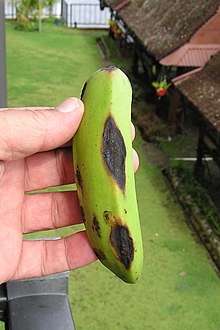Colletotrichum musae
| Colletotrichum musae | |
|---|---|

| |
| Colletotrichum musae forms the common black spots on ripe bananas | |
| Scientific classification | |
| Domain: | Eukaryota |
| Kingdom: | Fungi |
| Division: | Ascomycota |
| Class: | Sordariomycetes |
| Order: | Glomerellales |
| Family: | Glomerellaceae |
| Genus: | Colletotrichum |
| Species: | C. musae
|
| Binomial name | |
| Colletotrichum musae | |
Colletotrichum musae is a plant pathogen primarily affecting the genus Musa, which includes bananas and plantains. It is best known as a cause of anthracnose (the black and brown spots) indicating ripeness on bananas.[1]
Symptoms[edit]
Symptoms appear as dark brown/black lesions on green fruit. On yellow fruit these lesions increase in size, orange fungal growth can be found in centre of lesions. Symptoms can also be found on the tips of fruit.[2] Symptoms also include premature ripening of fruit.[2]
Management[edit]
The CABI-led programme, Plantwise recommend several methods to prevent the spread of the disease. These include; covering emerging fruit in plastic coverings and avoiding damage during harvest, removal of decaying parts and weeds of non-crop species to reduce favourable humid conditions for fungal infection.[2]
Plantwise also recommends sufficient irrigation and draining of plantations to reduce unnecessary conditions which favour fungi.[2]
Sources[edit]
![]() This article incorporates text from a free content work. Licensed under CC-BY-SA (license statement/permission). Text taken from PMDG: Anthracnose on banana, Plantwise, CABI.
This article incorporates text from a free content work. Licensed under CC-BY-SA (license statement/permission). Text taken from PMDG: Anthracnose on banana, Plantwise, CABI.
References[edit]
- ^ Zakaria, L; Sahak, S; Zakaria, M; Salleh, B (2009). "Characterisation of Colletotrichum species associated with anthracnose of banana". Trop Life Sci Res. 20 (2): 119–25. PMC 3819051. PMID 24575184.
- ^ a b c d "Plantwise Knowledge Bank | Anthracnose on banana". Plantwiseplus Knowledge Bank. Pest Management Decision Guides. 2018. doi:10.1079/pwkb.20187800642. S2CID 254012882. Archived from the original on 2020-06-26. Retrieved 2020-06-24.
